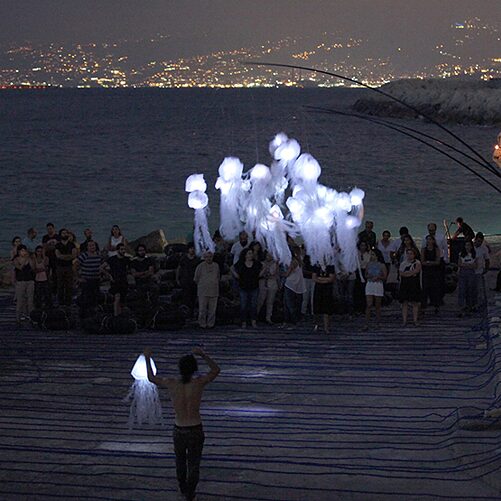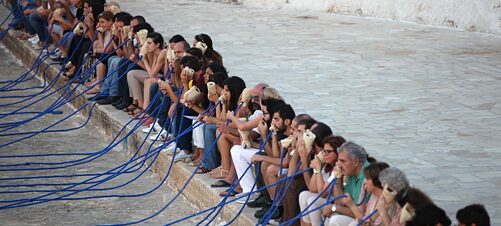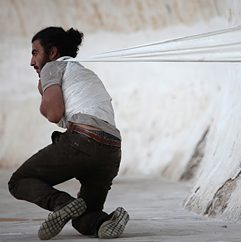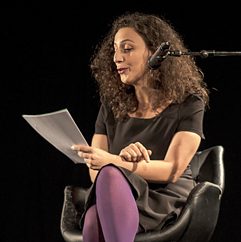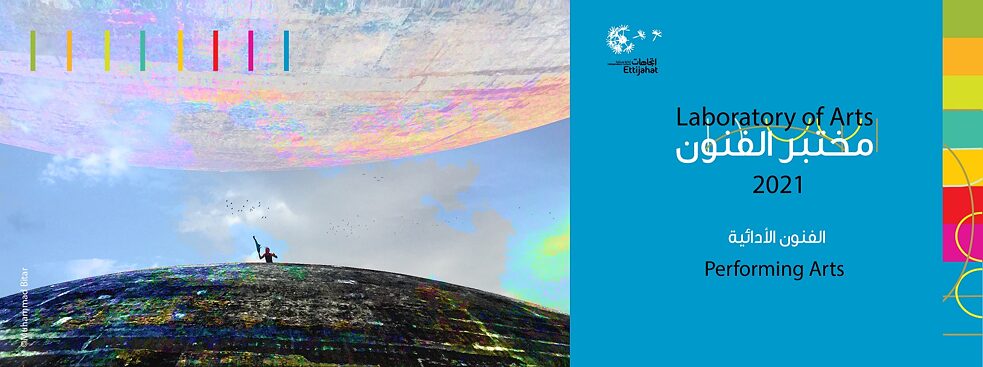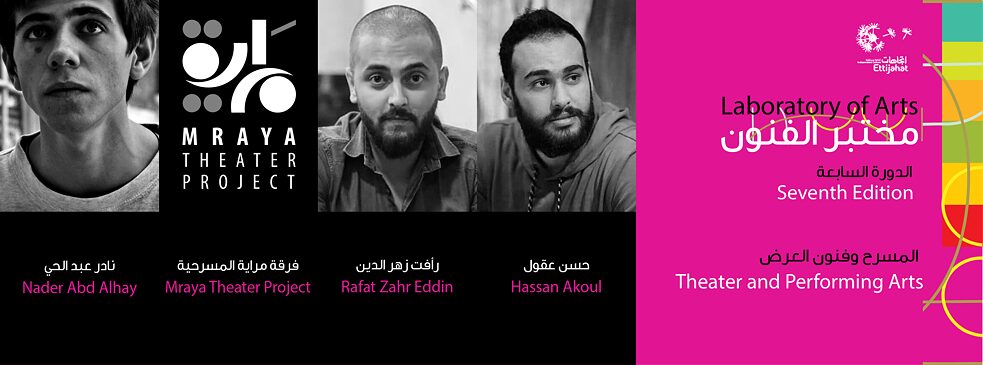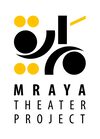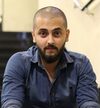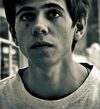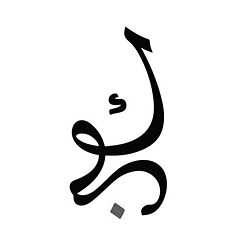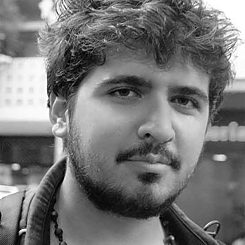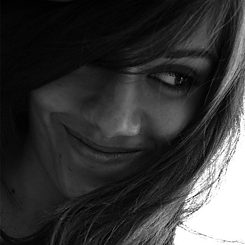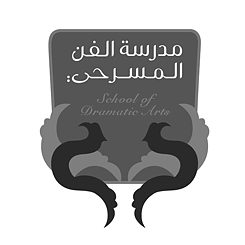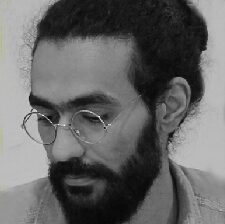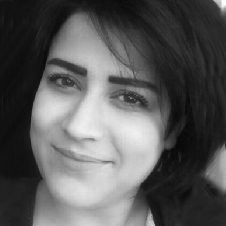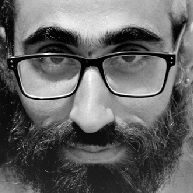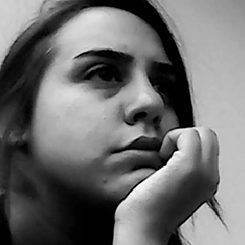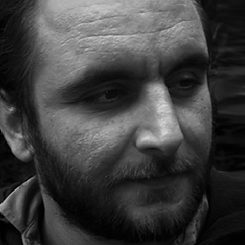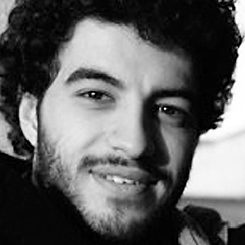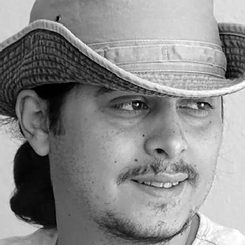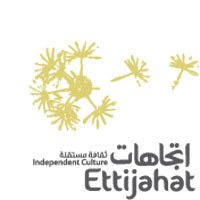Kifah Mahmoud Zaini | The Countryside’s Elderly | Retirees | The Sergeant
A theatre trilogy where the scripts are separate in terms of time and space, yet the characters are from one family. The three acts can be showcased together as part of one show, or each presented as separate stand-alone shows. The scripts attempt to dissect the Syrian family and raise questions around identity and its manifestations by tapping into several problematic issues including old age, succession, and loss of property.
Lara Waled Eilo | Ode to a Lonely Woman
The play follows the story of a lonely woman as she tells her story of her suffering and adventure to a documentary filmmaker, amid the hustle and bustle of a parallel world outside. While the world may take over her voice sometimes, she continues to fight back to make her voice heard.
Muhammad Bitar | Circuit
A sound and motion performance that delves into relationships and the body's mutual interactions with its
surroundings, in light of physical and psychological traumas. The performance is an experimental theatre function featuring several artists and will be showcased at the Rachid Karami International Fair Theatre, which has a special sound memory of its own, mainly echoing the war and its aftermath.
Rimi Sarmini | Honey, Gold, and the Sun
A theatre performance featuring the story of a man in his thirties, who was forced to emigrate and travel between different countries around the world without any documents proving his nationality or gender. His quest for stability and love led him to theatre, where he compares his journey to that of “Rimi, the homeless boy without a family”, in an attempt to accept others and reject any discrimination on the basis of race, gender, and religious belief.
Mraya Theatre Project | Crossing
A collective theatrical production experiment between Syrian, Bulgarian and Iraqi writers to produce a theatrical script and readings that address subjects of “state, patriotism, nationality, identity and borders.” The work deals with the question of identity and the internal struggle experienced by every migrant between their motherland and their country of refuge, in addition to the struggles of identity and belonging, the difficulties of achieving integration, and the concept of home and how it changes with every individual’s choice to let go of the past and start over.
Rafat Zahr Eddin | The Wall
A dance performance loosely adapted from the story of The Wall by Jean-Paul Sartre which discusses the impact of psychological and physical violence on people who are deprived of their freedom as the shadows of war and power struggles loom over them. The performance tells the story of Ibbieta, who is sentenced to death and asked to inform on his friend to save himself. It relies on physical performance as a means of expression and includes choreography workshops in which a number of dancers will try to create ‘new’ patterns of movement.
Hassan Akoul | Umm El Ghaith, Help Us
A theatrical script and readings that address the subject of violence against women within society and the many different ways in which women are deprived of freedom. The story is inspired by true events which took place in the region of Houla, Syria in 2005, in which a girl was imprisoned in a crypt because of her love for dancing. In the crypt, she made a friend, a wise doll called ‘Umm El Ghaith'. This friendship led to the girl being stigmatised as insane.
Nader Abd Alhay | Death is an Easy Act
A theatrical performance inspired by Intruder by Maurice Maeterlinck. The story is about the difficulties of introducing death into the life of a family which has unknowingly lost one of its girls in the river outside while the surviving members live a stable and blissful life inside. The project addresses the concepts of death and safety and their presence in modern life through theatrical performance and other artistic means, such as puppets.
Alaa Addin Alem | Sinking
A theatrical performance based on the story of a Syrian father and son who end up in contrasting positions as a result of the Syrian situation, which increases the radical contradictions between the two characters. Pushed by the pressure of the situation in Syria and the successive defeat, the father wanders through Europe, where he finds his stability and last resort. The son is searching for a paradise that is missing among the wreckage of his hopes for change and freedom. He seeks to uncover the meaning of his life, which is full of futility. The two, the son and the father, rotate in an inescapable orbit.
Fares Alzahaby | Rebellious Plays
A project that seeks to publish a book which includes a translation of four theatrical texts from Arabic to French, making them available for performance in French theaters. The project aims to promote artistic and cultural integration between the Syrian artists and the French society that is interested in learning about Arab and Syrian culture through the power of soft culture, which has become an essential bridge for communication between peoples. The project is a step to introduce French readers and viewers to the Syrian reality and modern theatrical experiences post-2011 and the asylum seeker crisis. It is also an important step in presenting Syrian theater written in its original language to the European public.
Hoor Malas | Resonator
A kinetic performance that features the choreographer Hoor Malas and director Mayar Alexani. The performance looks into the topography of the area responsible for memory function in the human brain and the damage it suffers as a result of Alzheimer’s. The work investigates the knowledge system that allows the humans to identify their own selves, the people around them and the roles they play, and exposes how this system could collapse.
Sara Eltaweel | Nowhere
A theatrical performance based on improvisation as actors tell their own stories. The idea emerged during a free improvisation workshop with 17 actors supervised by director Jamal Choucair. The workshop resulted in a main idea that focused on migration as a general concept that brought together various topics that are intertwined with each other and are related to the impact of what has happened in Syria at all levels, including love, loss, despair, and futility.
Koon Theater |
The Other Side of the Garden
Based on the novel The Story of a Mother by Hans Christian Andersen, the play tells the story of a mother who goes on a search for the king of death to retrieve her son. In the process, she loses her voice, hair, and eyes. Her sacrifices are futile, and she fails to save her son. We see the radical transformation of the mother on her journey, which is similar to the transformation of an individual living through war. The play focuses on the concepts of loss and sacrifice, as well as the story of death, or, the story of man as a creature who is inevitably destined to perish.
Omar Bakbook | Kordelo Shadow
"Kordelo Shadow" is a multimedia play that seeks to transcend the geographical boundaries of theater by combining two artistic forms: shadow theater and the selfie video. The show simulates the isolation felt by Syrians regardless of where they are, whether in prisons, or in besieged areas inside Syria, or even in the isolation of exile imposed by borders.
Rama Haydar | People of Love
"People of Love" is a play that examines the issues of identity crisis and alienation through the life story of Dr. Nabil and his wife, Nada. Uninterrupted by any significant events, the couple remain secluded in their new sanctuary after being displaced from their city of Damascus during the war. The project aims to shed light on the current social reality of living in countries of asylum and to portray the state of misery and intellectual idleness that has affected us all. The play also seeks to address social issues, including the unconscious conflicts between social classes through the polarizations we observe among the characters in the play.
School of Dramatic Arts | Harsh Lesson
"Harsh Lesson" is a play which aims to transform the stage into a psychological laboratory, in which viewers face a vivid experience to detect the source and causes of violence and cruelty. Four characters from the Faculty of Psychology (a professor, an assistant, and two students) subject themselves with nerves of steel to an intense experience that examines the relationship between loyalty and obedience to justify carrying out inhumane acts against others. The play put to the test new/old questions, such as: Can obedience that causes pain to others be justified? Can crimes committed in the name of values, religion, or humanity be justified?! These questions and many others are raised during the play against the backdrop of a love maze that binds the characters.
Aram Wahhoud | Fat Haki/Gibberish
Gibberish is made up of three interactive puppet shows: "Zakaria al-Mkarkak/ Zakaria the Messy" is a character whose roots extend to the so-called Arab Renaissance. All he does is talk about the glory of Arab literature and how it reached its peak.
Then, it is time to talk about physical prowess. Zakaria is a writer and poet who has a youthful spirit but who suffers from an eternal cough. The character of Zakaria is an interactive puppet made of newspapers and is animated by a person. The animator and the puppet share the same feet, but have a separate upper body. The dichotomy is caused by the intellectual-physical separation. Zakaria always appears in the least expected places to recite poems from his collection “Fatt Haki/Gibberish.”
Lojain Alaranji | Solitude
A monodrama theater script about a 50-year-old Syrian woman (female / worker / politician). She is single, (a spinster according to society) who has chosen to engage in ideological work in her youth, believing this is the way to save herself from the mediocrity of traditional female roles. The script draws on women experiences in politics and reveals the shortcomings of organized political party work as well as the nature of its members. The script introduces the world of women and their suffering.
Sari Almustafa | Injection/The Game
A theater project that simulates a social and human reality. It poses questions and themes that draw on our relationships and their implications by highlighting the influence of power on the one hand, and love (and its concepts, such as giving, sacrifice and loss) on the other.
After becoming deformed and sexually impotent due to injury caused by a mortar shell that killed his son, the husband (Karam) invents a game, where he puts his wife (Abeer, a doctor) and her lover (Bahaa, a young actor) under investigation and through punishment. A subsequent state of disclosure and clarity is revealed announcing the conspiracy of the wife and her lover against the exhausted husband who is a victim of successive losses.
Suzan Ali | Arabic Eyeliner
A monologue that depicts intense sensory moments lived by a girl after she experiences the death of her entire family in an explosion. The girl lives alone and soon begins talking to the objects and furniture around her. She has a sensory emotional memory, and as she fears the present and longs for the past, she humanizes the inanimate objects to the extent of considering them flesh and blood. The script clarifies a state of humanizing objects and transforming them into real, speaking persons that share one’s isolation and decisions.
Lama Khalil | Insomnia
A play showing excerpts of a Syrian man in his thirties trying to rediscover his new life, after being constantly on move from Syria to Lebanon and Turkey, ending up in Germany. In one fleeting moment, he loses sight of all his principles, goals, and dreams. The play explores how revolution, war, immigration, displacement, and loneliness took their toll on his life. The young man starts having sleeping disorders, and eventually severe insomnia. He tries to recall images, places, and people from his past life to help him reconnect to reality. All this happens without any links to his current reality—a mixture of daydreams, harsh reality, and illusions brought by his insomnia. He tries to contextualise his new life with images from the past, in order to know whether he is awake or dreaming. Does he really exist, or is all this just an illusion? Who was he and who is he now? What is the answer?
Wael Ali | Temporary Stay
An old audio cassette is found among the abandoned belongings in a family home in Beirut. The cassette was recorded in Uppsala in Sweden in 1976 during the Lebanese civil war. The recording holds the voices of people in exile who have just arrived to Europe and who are telling other family members – hopefully, the future emigrants - about their new life, including details about administrative procedures they have to carry out, their discovery of a new culture, and their nostalgia for the country they had left behind.
Chrystèle Khodr and Waël Ali used the cassette as the starting point to question the history of immigrations and immigrants from the Ottoman Empire of the early 20th century until the years 2000 in Europe. Temporary Stay creates a space of crossed views that allows us to deal with the question of migration as a common history. “The story of people who see their birthplace slowly fading and then quietly disappearing."
Mayar Alexan | Ticket to Atlantis
Ticket to Atlantis is a performance and audio-visual project on the relationship between the human body and the sea as presented within a sensory, historical context. Performers will share with the audience a journey in search of lightness. The performance takes the experiences of migrants at sea as a lived reality as a starting point and asks: what happens when we connect the obsession to find a safe place to live with the legend of Atlantis?
Yasser Abu Shaqra | The Last Month of the Fifth Year
The Last Month of the Fifth Year is a play about a Syrian-Palestinian playwright who is living in Turkey and in search for the topic of his next play. At his workplace, he meets a Syrian gay man who is ten years younger. The playwright decides to write his next play about the young man, documenting his life through regular meetings while getting involved in all its facets. Meanwhile the writer’s relationship with his girlfriend is changing as she keeps moving from one place to another. Turkish and Syrian characters enter a web of relationships and the heart of the play becomes about the search for the meaning of love, war, and identity.
Omar Al Jbaai | The Window
The Window is a theatrical performance of the script titled “Okno” written by Polish author Ireneusz Iredynsk in 1968. Iredynsk skilfully merges the realistic and mundane with the surreal to reveal the “calcification” of the relationship between spouses: “her” and “him.” The reason of this calcification is the transformation of what is human into machine, leading one to cocoon on oneself and take refuge in their routine, turning emotions and feelings into mere things.
The project poses artistic challenges in terms of its content and form; the text was written primarily for radio rather than the theatre. It is also a deceptive text: it raises the idea of hope (the torch) as a potential turning point in the couple's relationship, leading to a more mutually understanding relationship. Yet any hope or transformation they realise comes from their neighbours’ window, indeed, and any misery is brought about by two people, sitting, waiting for a match that may or may not be stricken.
The show consists of a variety of overlapping media within the performing arts (dance, mime, puppets, and realist/psychological performance). As the structure of the existing text is based on an overlap between the mundane and the surreal, it requires a theatrical structure that is able to express both.
Randa Maddah | A Project of Separation
The idea behind A Project of Separation reflects its origins: borders imposed by wars, stretching into the horizon. Randa Maddah, the project manager, says: "It is imperative that we find an image within these borders other than that of a still life with a fence that does not mean a lot to my generation. We, who have been born during the time of the occupation, lack the awareness and understanding of what a border means symbolically: barriers and forced separation.”
In the work that has yet to be completed, a wall made of different materials will be built; it is made out of the same materials used in the construction of barriers, walls, and checkpoints in unstable, war-torn countries. A construction worker will build the wall professionally, with detailed faces sculpted onto the surface, extending to close off the horizon in the scene. In the end, he will paint the wall making the scenery monotonyus, and perhaps, the story will be lost.
The work will also contain voice recordings – excerpts from the life stories of some of the region's residents who were born before the occupation and who lived there through the tumultuous times, including the decision to annex the Golan Heights, and up until today. The stories will not be heard directly from the wall, but from behind it, to emphasise the idea of segregation and separation.
